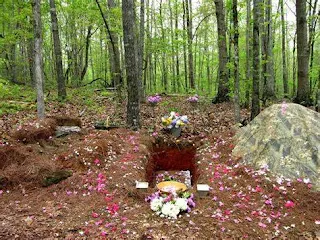Natural Burial Practices in Africa
Natural burial practices in Africa are sustainable and eco-friendly options and have been practiced for thousands of years.
Natural burial is a type of burial that minimizes the environmental impact of traditional burial practices. It is a more sustainable alternative to traditional burial, which can have a significant impact on the environment.
Natural burial minimizes its environmental impact by using no embalming fluid is used as embalming fluid is a toxic chemical that can pollute the soil and water. The body is wrapped in a biodegradable shroud or placed in a simple wooden casket. These materials will decompose naturally and will not harm the environment.
The body is buried in a natural setting, such as a forest or meadow. This helps to preserve the natural environment and allows the body to decompose naturally. No headstone or other monument is placed at the gravesite. This helps to keep the burial site natural and undisturbed.
Natural burial is a type of burial that seeks to minimize the environmental impact of traditional burial practices. It involves burying the body without embalming fluids, in a biodegradable casket or shroud, in a location that allows for natural decomposition of the body.
In Africa, natural burial practices have been a part of many African tribes and cultures for centuries. Traditional African burial customs often involve returning the body to the earth in a way that allows for natural decomposition.
This may involve burying the body in a shallow grave or wrapping the body in a shroud and placing it on a raised platform, allowing it to decompose and return to the earth. In recent years, there has been a growing renewed interest in natural burial practices in Africa and around the world, as people seek more sustainable and eco-friendly options for burying their loved ones.
Some communities in Africa have established natural burial grounds or green cemeteries, which provide a space for natural burial and promote conservation and biodiversity. African natural burial practices are a beautiful and environmentally friendly way to honor the dead. They help to preserve the natural environment and allow the body to decompose naturally, returning nutrients to the soil. These practices are also a way to connect with the past and to celebrate the cycle of life.
Natural burial in Africa is also closely tied to cultural and religious traditions.
For example, in many African cultures, burial is seen as a sacred and important ritual that honors the deceased and brings comfort to the bereaved. Natural burial practices can be seen as a way to uphold these cultural and religious traditions while also caring for the environment. Natural burials in Africa reflects the rich diversity of cultural and environmental practices found on the continent, and offers a sustainable and meaningful way to honor the deceased and care for the earth.
There are many types of natural burials, which all share the common goal of minimizing the environmental impact of traditional burial practices.
Five natural burials.
Green burials.
This type of burial involves burying the body in a biodegradable casket or shroud without embalming fluids.
The burial site may also be designed to promote ecological conservation and restoration, such as by using native plants and avoiding the use of pesticides.
Water burials.
This type of burial involves placing the body in a biodegradable casket or shroud and lowering it into a body of water, such as a river or ocean. The body decomposes naturally and becomes part of the aquatic ecosystem.
Tree burials.
This type of burial involves burying the body in a biodegradable casket or shroud at the base of a tree. As the body decomposes, it provides nutrients to the tree and helps it grow.
Natural cemetery burials.
This type of burial involves burying the body in a designated natural cemetery or green burial ground. These cemeteries are often designed to be ecologically sustainable and promote conservation, such as by using native plants and avoiding the use of embalming fluids and concrete vaults.
Home funerals.
This type of burial involves caring for the deceased at home and preparing the body for burial without the use of embalming fluids. The body is then buried in a biodegradable casket or shroud in a location that allows for natural decomposition. Home funerals can be a more intimate and personal way to honor the deceased, and can also reduce the environmental impact of traditional funeral practices.
More links to articles you will find thought provoking.
- Dangerous Erupting Volcanoes of Africa

- Top 20 Largest Countries in Africa

-
What is an African Proverb

- African Water Spirit Mami Wata

-
Ancestors are Guardian Angels








